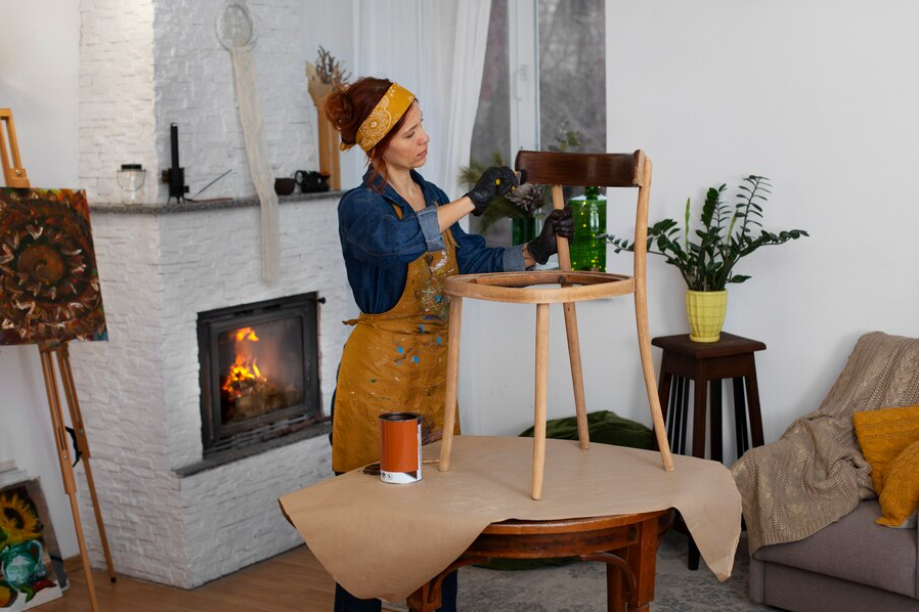Tired of furniture with hidden costs? This article explores the growing trend of ethical furniture, where every piece reflects your values and makes a positive impact. Ditch unsustainable materials, unfair labor practices, and short lifespans. Instead, embrace eco-friendly materials, fair wages, and durable construction. Discover how ethical furniture benefits people, the planet, and your own well-being. Learn where to find ethical brands, support local businesses, and upcycle pre-loved treasures. Furnish your life with integrity and join the movement for a more sustainable and responsible future. Let’s create homes that are beautiful, ethical, and built to last!

The Growing Conscience of Home Design: Why Choose Ethical Furniture
Our homes are sanctuaries, reflecting our personalities and values. But the furniture we choose often carries hidden costs beyond the price tag. This is where ethical furniture steps in, offering a conscious approach to decorating with a positive impact on people and the planet.
The Hidden Costs of Conventional Furniture
Conventional furniture production often involves:
Unsustainable materials: Deforestation, resource depletion, and harmful chemicals threaten ecosystems and human health.
Unfair labor practices: Low wages, unsafe working conditions, and exploitation plague many furniture manufacturing chains.
Short lifespans and waste: Poorly made furniture ends up in landfills, contributing to the growing waste crisis.
Beyond Aesthetics: The Impact of Furniture on People and Planet
Ethical furniture considers the entire lifecycle of a product, from sourcing to disposal. This means:
Sustainable materials: Opting for recycled, reclaimed, or FSC-certified wood, organic fibers, and low-impact materials.
Fair labor practices: Supporting brands that ensure fair wages, safe working conditions, and respect for worker rights throughout the supply chain.
Durable construction: Investing in well-made furniture that lasts, reducing waste and resource consumption.
Investing in Your Values: How Ethical Furniture Makes a Difference
Every piece of ethical furniture you choose represents a vote for a better future. You are:
Supporting responsible businesses: Encouraging companies to prioritize sustainability and ethical practices.
Creating a healthier home: Avoiding harmful chemicals and toxins often found in conventional furniture.
Reducing your environmental footprint: Minimizing waste and resource consumption associated with furniture production.
Making a positive social impact: Contributing to fair labor practices and empowering communities.
Unveiling the Pillars of Ethical Furniture: What to Look For
Choosing ethical furniture goes beyond aesthetics; it’s about aligning your home with your values. But how do you identify furniture that stands by ethical principles? Here are the key pillars to consider:
Sustainable Materials: From Forest-Friendly Wood to Recycled Wonders
Say goodbye to unsustainable deforestation and harmful chemicals. Look for furniture made with:FSC-certified wood: Ensures responsible forest management and protects biodiversity.Recycled or reclaimed materials: Gives unwanted materials a second life, reducing waste.Natural fibers: Opt for organic cotton, linen, or wool for healthier alternatives.Low-impact materials: Explore bamboo, cork, or recycled plastics for sustainable choices.
Fair Labor Practices: Ensuring Ethical Treatment Throughout the Supply Chain
Exploitation has no place in ethical furniture. Seek brands that: Prioritize fair wages and safe working conditions for all workers throughout the chain. Promote transparency in their manufacturing processes and supply chains. Support local communities by sourcing materials and labor ethically. Hold certifications like Fair Trade or B Corp that verify their commitment to fair labor.

Chemical-Free Comfort: Prioritizing Health and Environmental Wellness
Chemicals in furniture can pose health risks and pollute the environment. Choose furniture that:Uses low-VOC (volatile organic compounds) materials to minimize harmful emissions.Avoids formaldehyde and other toxic chemicals in finishes and glues.Offers natural, non-toxic alternatives for fabrics and upholstery.Has certifications like GREENGUARD or Oeko-Tex that guarantee low chemical emissions.
Durability and Longevity: Investing in Quality for a Sustainable Future
Cheap, disposable furniture ends up in landfills. Invest in:Solid construction with quality materials like solid wood or durable metals.Timeless designs that won’t go out of style quickly, avoiding unnecessary replacements.Craftsmanship and repair options to ensure your furniture lasts for generations.Brands known for their commitment to durability and longevity.
Exploring the Landscape: Where to Find Ethical Furniture Brands
Finding ethical furniture doesn’t have to be overwhelming. Explore diverse avenues to discover pieces that align with your values and style:
Independent Artisans and Makers: Unearthing Unique Treasures
Support individual talent and find truly unique pieces!Craft fairs and markets: Meet artisans directly and learn about their process.Online platforms like Etsy and Chairish: Find diverse styles and support small businesses.Local artist studios and galleries: Discover hidden gems and connect with your community.
Certified Sustainable Brands: Navigating the Labels and Standards
Look for brands committed to ethical practices through certifications:
Forest Stewardship Council (FSC): Ensures responsible forest management.Fair Trade Certified: Guarantees fair wages and safe working conditions.Global Organic Textile Standard (GOTS): Verifies organic fiber content.GREENGUARD Certified: Lowers exposure to harmful chemicals.
Vintage and Upcycled Finds: Breathing New Life into Pre-Loved Pieces
Squeeze sustainability and discover unique character:
Thrift stores and antique shops: Unearth hidden gems and reduce waste.
Furniture upcycling workshops: Learn to transform pre-loved pieces.
Online marketplaces dedicated to vintage and upcycled furniture: Find curated collections.


Beyond Shopping: Adopting Conscious Consumerism
Your ethical journey doesn’t end with purchase. Here’s how to extend your commitment to sustainability and responsibility:
Sustainable Practices at Home: Care and Maintenance for Longevity
Treat your ethical furniture with respect for a long and healthy life:
Use natural cleaning products: Avoid harsh chemicals that damage materials and release toxins.
Proper care and maintenance: Follow manufacturer recommendations for specific materials.
Invest in repairs: Extend the lifespan of your furniture instead of replacing it.
The Power of Upcycling and DIY: Reimagining What You Already Own
Give pre-loved pieces a new lease on life and unleash your creativity:
Upcycle old furniture: Repurpose, paint, or reupholster for a fresh look.
DIY projects: Build simple furniture pieces with sustainable materials.
Embrace imperfections: Celebrate the unique character of upcycled treasures.
Responsible Disposal: Giving Furniture a Second Life Ethically
When it’s time to let go, choose responsible options:
Donate to charities or furniture banks: Give your furniture a second chance.
Organise local swaps or giveaways: Find new homes for unwanted pieces.
Recycle appropriately: Follow local guidelines for material-specific recycling.
Advocacy and Awareness: Promoting Change in the Furniture Industry
Be a voice for change and inspire others:
Support organisations advocating for ethical furniture practices.
Spread awareness on social media and within your community.
Talk to businesses about your ethical preferences.
Resources
- The Good Shopping Guide: https://thegoodshoppingguide.com/ethical-furniture/ (Discusses ethical considerations beyond environmental impact, including labor conditions and fair trade)
- Forest Stewardship Council (FSC): https://fsc.org/en (Offers information on FSC certification for responsible forestry practices)
